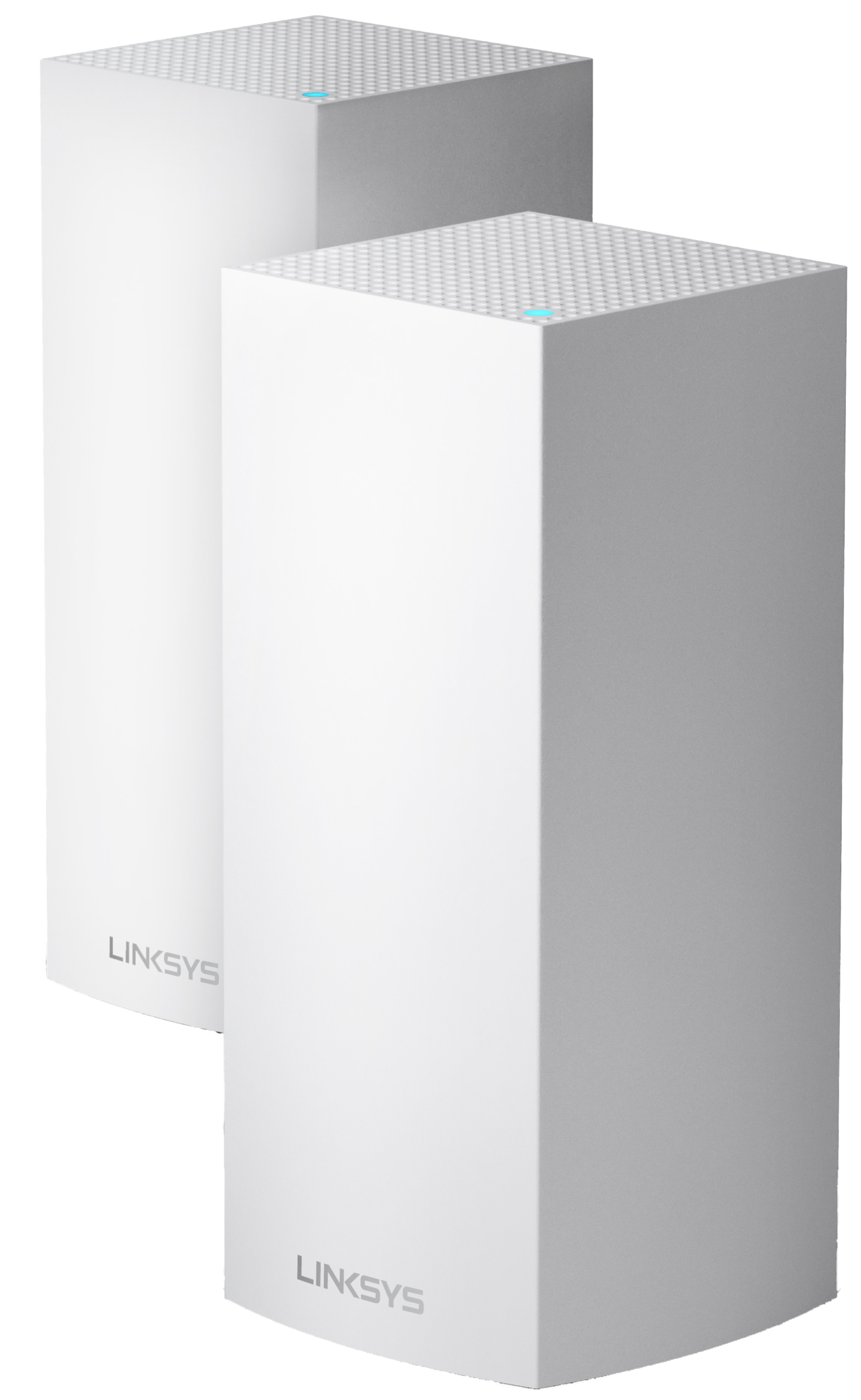A balanced mesh
Linksys Velop MX10
Pros
- AX5300 speeds
- WPA3 support
- Backward compatible with older Velop nodes
- Four Ethernet ports per node
Cons
- No dedicated mesh band
The Linksys Velop MX10 is one of the best-balanced mesh systems available with plenty of speed for a gigabit internet connection and four Ethernet ports on each node for wired devices. The MX10 can also be dropped into an existing Velop mesh as an easy upgrade with the older nodes left over for expansion.
Dedicated Wi-Fi link
Netgear Orbi WiFi 6 (RBK852)
Pros
- AX6000 speed
- 2.5Gbps WAN port
- Four Ethernet ports per node
- Dedicated mesh band
Cons
- Doesn't work with older Orbi nodes
- More expensive
The Netgear Orbi WiFi 6 has a lot of great features and is one of the only mesh systems to have a multi-gig WAN port to connect to networks at faster speeds than 1Gbps. It also has support for a fast AX6000 connection with one 5GHz band dedicated to the mesh to keep speed and connection quality high across the entire network.
The Linksys Velop MX10 is a sensibly balanced Wi-Fi 6 mesh system and even keeps compatibility with older Velop mesh nodes. The Orbi WiFi 6 gets higher Wi-Fi speeds but not by enough that most people would notice. The Orbi is a better fit for someone with an existing wired network with speeds over 1Gbps, even though for now, most home internet connections max out at 1Gbps. For most people, the Velop MX10 will deliver a very similar level of performance on the majority of devices at a lower cost.
Netgear Orbi 6 vs. Linksys Velop MX10 Velop focuses backward compatibility
If you are considering a mesh Wi-Fi system, it's likely because a traditional centralized router isn't providing consistent or fast coverage. One of the strengths of a mesh is that it can be expanded based on your needs to fit your home. The Linksys Velop series has a lot of options for expanding your mesh system whether you want to buy more Wi-Fi 6 routers or older, slower Wi-Fi 5 equipment. This older equipment is much cheaper and can be a good way to get internet service into low priority areas cheaply.
Netgear's Orbi line also has a lot of options but, unfortunately, the Orbi WiFi 6 system is only compatible with other Wi-Fi 6 Orbi equipment. This ensures a fast and consistent experience but raises the cost of expansion and also means you can't upgrade an existing Orbi system with Wi-Fi 6 equipment.
| Linksys Velop MX10 | Netgear Orbi WiFi 6 (RBK852) | |
|---|---|---|
| Wireless speed | AX5300 | AX6000 |
| Wi-Fi standard | Wi-Fi 6 (802.11ax) | Wi-Fi 6 (802.11ax) |
| LAN Ethernet ports | 4 per node | 4 per node |
| Setup | App or web | App or web |
| Dimensions | 4.33x4.33x9.84 inches | 10x2.8x7.5 inches |
| WAN speed | 1Gbps | 2.5Gbps |
On the spec sheet, these routers have quite a lot in common, with the Orbi coming in with slightly faster speeds. Overall, the Orbi system is better suited for a high-end wired network, especially one with network storage thanks to the 2.5Gbps WAN port. Still, for most normal usage including multiple 4K video streams, the Velop's 1Gbps internet speed should be more than sufficient.
Netgear Orbi 6 vs. Linksys Velop MX10 Coverage and expansion
Out of the box, the router and node included with the Velop Mx10 system offer 6,000 square feet of coverage. This will be enough for most homes and careful placement can ensure you dodge things that might block your wireless signals such as concrete or brick walls. Of course, if you end up needing more coverage or have dead spots you can always expand your mesh.
By maintaining compatibility with older Velop systems, Linksys has allowed for a ton of expansion options. These options range from smaller dual-band Wi-Fi 5 systems to tri-band Wi-Fi 5 systems. Of course, there is also the option of adding a standalone Velop MX5 Wi-Fi 6 router as a node.
The RBK852 Orbi WiFi 6 pack includes one router and one node, which adds up to 5,000 square feet of coverage. If you know you'll need more, you can start with the three-pack or add additional nodes as needed. It is a bit disappointing that an existing Orbi system can't be upgraded with this new router but it does mean you'll have a faster, more consistent experience throughout your network.
Netgear Orbi 6 vs. Linksys Velop MX10 More than enough speed
The majority of home internet connections max out at 1Gbps on cable or fiber. Both the Orbi and Velop systems are more than capable of delivering these speeds to compatible devices. For now, only a handful of newer network cards and phones will be able to take advantage of the full speed of either system. That being said, you likely won't notice the deficit outside of large downloads and speed tests.
The Orbi system has a slight speed advantage as part of a mesh with 1200Mbps available on the 2.4GHz band and 2400Mbps available on one of its 5GHz bands. The final 5GHz band with 2400Mbps is dedicated to maintaining the mesh connection.
The Velop isn't far behind with 1174Mbps at 2.4GHz and 2402Mbps and 1733Mbps available on the two 5GHz bands. At first glance, it looks like the Velop is much faster and it can be, but in a mesh, it will have to share the wireless connection with a link to the base router. Still, it should be able to deliver a 1Gbps connection with a good signal.
Netgear Orbi 6 vs. Linksys Velop MX10 Will they blend in?
Netgear and Linksys each took a different approach to design. The Velop routers look like part of an obelisk while the Orbi routers have a wider, but shallower housing. The Orbi router will stand out more with a two-tone color scheme that makes it look more like a space heater. Still, neither router looks bad, and both keep all wired connections to a small area on the rear of the router allowing you to easily conceal all wires.
It's likely the Velops will more easily blend in with a room's decor which can be a plus when you are trying to find the best place for your mesh's signal.
Netgear Orbi 6 vs. Linksys Velop MX10 Two super-fast systems
If you're looking for great wireless coverage in a large home, you can't go wrong with either system. The Netgear Orbi Wi-Fi 6 system strives for consistency with its dedicated band but in most cases, the Linksys Velop MX10 will be able to match the performance and will do so at a lower price. To help your decision, you can also add in Wi-Fi 5 Velop nodes to cheaply fill in dead spots where speed isn't as important. Both systems are great options but the Linksys Velop MX10 checks more boxes for more people.
A balanced mesh
Linksys Velop MX10
Great coverage and plenty of speed
$600 at Best Buy $700 at Dell $550 at B&H
A great balance of Wi-Fi 6 speed and coverage makes the Linksys Velop MX10 one of the best options to upgrade your home Wi-Fi.
Dedicated Wi-Fi link
Netgear Orbi WiFi 6 (RBK852)
Fast WAN and a dedicated band
$700 at Amazon $700 at Best Buy $700 at B&H
Fast and consistent Wi-Fi 6 speeds with a 2.5G WAN port makes the Netgear Orbi WiFi 6 system a great upgrade for a home network.
from Android Central - Android Forums, News, Reviews, Help and Android Wallpapers https://ift.tt/2uCMaNm
via IFTTT










0 comments: